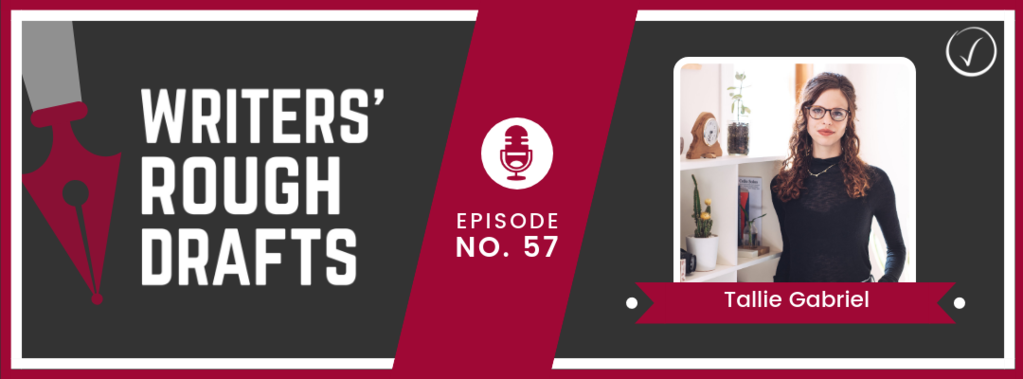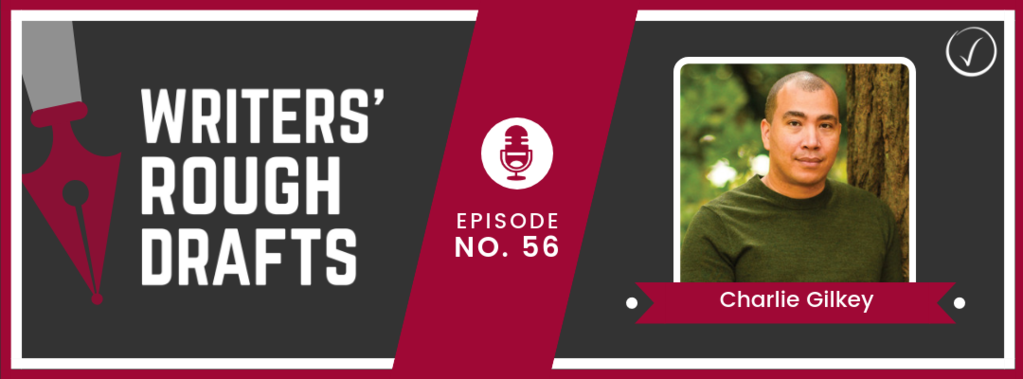- You are here:
- Home »
- Blog

Writers’ Rough Drafts – Episode #57 With Tallie Gabriel
Or listen on: iTunes| Stitcher| Spotify| Google Play| Download
Tallie Gabriel is a freelance writer, young adult author, musician, podcast producer, and occasional podcast host. With bylines on sites and publications like VICE, Considerable, Thrive, The Content Strategist, and The Freelancer, she also hosts an impressive client roster of freelance and social media clients through companies like Lighthouse Creative Group and Find a Way Media.
Since February 2019, she has been exploring different ways to apply writing, sound, and creativity across mediums as a podcast producer and occasional host for Unthinkable Media. She continues this exploration by singing and playing cello in the indie folk band Cardboard Rocketship. Tallie is currently represented by literary agent Alyssa Jennette of Stonesong Literary Agency.
Continue reading
The Price of the Comma Splice
Part of my Master of Fine Arts in fiction offered the opportunity to work as a teaching apprentice and later, an adjunct, in college composition courses. For three semesters, I commuted three hours each way to sit in on, and teach, courses for college students learning how to become stronger readers and writers.
The most common grammatical error I came across was the comma splice. This sneaky devil has appeared outside of academia, too. I’ve seen it on websites, in business publications, and even in a novel.
The instance that stood out the most to me was actually a sentence that was both a run-on and spliced. It had two comma splices. I don’t recall the exact wording, but it went something like this:
It was a difficult time in my life, I learned a lot about change and how to cope with it, I know I can tackle everything college has to throw at me.
A comma splice is when two (or more) independent sentences are separated only by a comma, as in the example above. Basically, it’s an example of glueing the sentence parts together in a way that can confuse the reader.
Comma splices present a unique problem for readers: They make it unclear which clauses or phrases contain the most important information.
You’re probably thinking that unless someone is a grammar guru, they’re not going to care. The truth is that while, yes, some readers might not notice and/or care, there are readers who will notice, and not in a positive way.
Continue reading
Writers’ Rough Drafts – Episode #56 With Charlie Gilkey
Or listen on: iTunes| Stitcher| Spotify| Google Play| Download
Charlie Gilkey is an entrepreneur, philosopher, former Army officer, author, and Creative Giant. As the founder of Productive Flourishing, alongside his wife Angela, he helps people take action on the work and stuff that matter to them. As a speaker and business coach, he focuses on productivity and planning for creatives, entrepreneurs, and small business owners. Before this, he worked as a professor of philosophy (so yes, he’s an actual accredited philosopher!) at the University of Nebraska as he was earning his doctoral degree, while simultaneously managing a career as a Joint Force Military Logistics officer in the Army National Guard.
The author of two books, The Small Business Lifecycle: A Guide for Taking the Right Steps at the Right Time to Grow Your Small Business and the forthcoming Start Finishing: How to Go from Idea to Done, Charlie’s writing and work have always been based on theory and mindset, while focusing on information that is both practical and actionable.
Continue reading
The Karma of Writing: 7 Types of Authorial Enlightenment
Writers are like ice cream: They come in different flavors. Some of us are plain vanilla, others are passion-fruit granita with creamy lime curd. Most of us try to find authorial enlightenment, which—like a karma of writing—promises nirvana once we go through enough hardships and lessons.
We are all different. You are special, just like everybody else. A catchy, tongue-in-cheek thing to say, and yet true in some esoteric way, as it can help you better understand yourself.
These are the qualities of this post as well.
The term karma of writing has a catchy ring to it. Just like everything that includes the words “karma,” “Zen,” or… “quantum,” it’s surrounded by a certain aura of mystique. To talk about the karma of writing almost sounds as if I were trying to sell a New Age book, doesn’t it?
Rest assured, I’m not. You see, this post is itself tongue-in-cheek. There is no actual karma of writing, and I’ve made up the seven types of authorial enlightenment, because seven is a satisfying number—would you have taken me seriously if I’d talked about the six or eight types of authorial enlightenment?
And yet, the post is true and it can help you better understand yourself. In particular, it can help you understand what kind of writer you are. Let’s get started!
Continue reading